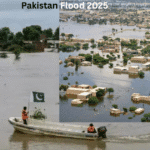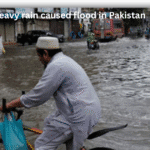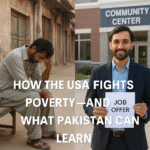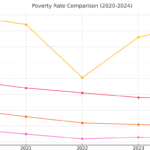NOTE! (In this post, I share why many Pakistanis and South Asians, like me, are leaving their home countries for a better life abroad. I talk about real issues like unfair systems, lack of good healthcare and education, and how talented people are often ignored. It’s a personal story that many of you might relate to…)
I still remember the peaceful mornings in Islamabad—the Margalla Hills in the backdrop, the Melody Food Park, with the delicious smell of all kinds of food, chai stalls everywhere, and lots of wild trees all around. I remember it so clearly, and that familiar neighborhood buzz. Islamabad will always hold a special place in my heart. But despite its natural beauty and calm lifestyle, I, like many others from Pakistan and South Asia, chose to leave and start over in the West—in my case, the United States.
You might ask: Why leave home if you love it so much?
Well, here’s the honest truth—because deep down, we all want a better future. And that better future, for many of us, feels more reachable abroad.
Here, I’ll share a few points based on my personal experience. Your experience might be different
1. The Dream vs. Reality in Our Home Countries
I was brought up in Pakistan, where I was taught to work hard, be honest, and believe that talent will triumph. But life had other plans. In the majority of South Asian countries, including Pakistan, the favor is typically done for individuals who know “someone” instead of individuals with talent. You may have a degree, talent, and passion, but if you don’t “know someone,” doors won’t open.
Here, however, I noticed something else. I did not have powerful contacts or relatives in crucial positions upon my arrival. Nonetheless, I was promoted based on merit. My work was respected. Not promotions but achievements were dependent on “sifarish” (recommendation).
2. Rule of Law vs. Rule of Who-You-Know
One thing that hit me hard after moving to America was how seriously people follow rules here. From traffic lights to taxes, rules are for everyone—rich or poor. In Pakistan, unfortunately, rules often bend for the elite. Even basic services like getting a driver’s license or resolving a legal issue can turn into a nightmare if you don’t know the “right person.”
Living in a country where the law actually protects you instead of scaring you—it’s life-changing. It gives you a sense of freedom and fairness that many of us rarely feel back home.
3. Quality of Life: Not Just About Money
It’s not just about higher salaries or bigger houses. Life here in the U.S. comes with clean streets, public libraries, safe parks, reliable public services, and most importantly—dignity for everyone. I’ve seen janitors, waiters, and delivery drivers here treated with more respect than some office managers back home.
In Pakistan and many South Asian societies, there’s an unhealthy obsession with “status.” But in developed countries, respect isn’t based on your job title or your clothes. It’s based on your behavior and contribution to society.
4. Education and Opportunities for the Next Generation
Let’s be real—every parent wants their children to grow up safe, educated, and with options. In Pakistan, even if you’re well-off, you’re always worried about education standards, curriculum gaps, or instability.
Here in the U.S., my children have access to quality public schools, libraries full of books, and exposure to creative thinking from an early age. They’re learning not just how to pass exams—but how to think critically, ask questions, and be confident. Isn’t that what real education should be about?
5. Healthcare and Social Security
Back home, even a small health emergency can wipe out a family’s savings. The government hospitals are overcrowded, and private care is out of reach for most. In Pakistan, one big issue is that governments rarely complete their full term. And even if one government starts something good—especially in healthcare, the next one usually ends it.
In contrast, the U.S. has a structured (though expensive) healthcare system, but at least there’s insurance, emergency care, and long-term medical planning. Systems like unemployment support, disability benefits, and old-age security are in place to catch you when life gets tough.
6. Why Are We Behind?
It’s not that Pakistanis or South Asians lack talent—we don’t. I’ve seen brilliant minds back home doing wonders with little resources. The actual problem is structural: corruption, lack of transparency, bad governance, and obsolete mindsets are holding us back.
I still remember when my immediate manager applied for a project manager position at a government organization in Pakistan. At the same time, there was a similar job opening in the USA that required the same qualifications—a BSc in Engineering and a PMP certificate. He applied to both. Within two months, he got the job offer from the USA and flew out. But the Pakistani department never even replied. This is how brain drain happens.
I personally think we must invest in education, stimulate innovation, and above all, make the system inclusive for all—not only for the affluent or well-connected. Until then, brain drain will be on the rise. Individuals will continue to emigrate—not because they do not love their motherland—but because they do not perceive hope.
Final Thoughts: Love Doesn’t Mean Staying Silent
Even though I live in the U.S. now, my heart still beats for Pakistan. I want it to grow, to succeed, to be a place where no one has to leave for a better life. But change won’t come unless we accept our flaws and fix them.
Until then, many of us will continue to pack our bags—not because we gave up—but because we believe we deserve a fair shot at a better future.
And maybe, just maybe, someday we’ll return—not to escape—but to help rebuild.
Have you ever thought about moving abroad? Or maybe you already have? Share your story in the comments below or connect with us—we’d love to hear your journey!











2 thoughts on “Why Pakistanis Leave Their Country”